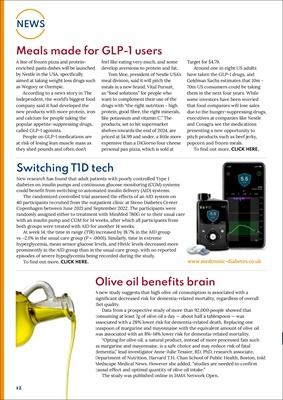
12
NEWS
Meals made for GLP-1 users
A line of frozen pizza and proteinenriched
pasta dishes will be launched
by Nestle in the USA, specifically
aimed at taking weight loss drugs such
as Wegovy or Ozempic.
According to a news story in The
Independent, the world's biggest food
company said it had developed the
new products with more protein, iron
and calcium for people taking the
popular appetite-suppressing drugs,
called GLP-1 agonists.
People on GLP-1 medications are
at risk of losing lean muscle mass as
they shed pounds and often don't
feel like eating very much, and some
develop aversions to protein and fat.
Tom Moe, president of Nestle USA's
meal division, said it will pitch the
meals in a new brand, Vital Pursuit,
as "food solutions" for people who
want to complement their use of the
drugs with "the right nutrition - high
protein, good fibre, the right minerals,
like potassium and vitamin C." The
products, set to hit supermarket
shelves towards the end of 2024, are
priced at $4.99 and under, a little more
expensive than a DiGiorno four cheese
personal pan pizza, which is sold at
Target for $4.79.
Around one in eight US adults
have taken the GLP-1 drugs, and
Goldman Sachs estimates that 10m -
70m US consumers could be taking
them in the next four years. While
some investors have been worried
that food companies will lose sales
due to the hunger-suppressing drugs,
executives at companies like Nestle
and Conagra see the medications
presenting a new opportunity to
pitch products such as beef jerky,
popcorn and frozen meals.
To find out more, CLICK HERE.
Switching T1D tech
New research has found that adult patients with poorly controlled Type 1
diabetes on insulin pumps and continuous glucose monitoring (CGM) systems
could benefit from switching to automated insulin delivery (AID) systems.
The randomized controlled trial assessed the effects of an AID system on
40 participants recruited from the outpatient clinic at Steno Diabetes Center
Copenhagen between June 2021 and September 2022. The participants were
randomly assigned either to treatment with MiniMed 780G or to their usual care
with an insulin pump and CGM for 14 weeks, after which all participants from
both groups were treated with AID for another 14 weeks.
At week 14, the time in range (TIR) increased by 18.7% in the AID group
vs −2.1% in the usual care group (P < .0001). Similarly, time in extreme
hyperglycemia, mean sensor glucose levels, and HbA1c levels decreased more
prominently in the AID group than in the usual care group, with no reported
episodes of severe hypoglycemia being recorded during the study.
To find out more, CLICK HERE. Olive oil benefits brain
A new study suggests that high olive oil consumption is associated with a
significant decreased risk for dementia-related mortality, regardless of overall
diet quality.
Data from a prospective study of more than 92,000 people showed that
consuming at least 7g of olive oil a day - about half a tablespoon - was
associated with a 28% lower risk for dementia-related death. Replacing one
teaspoon of margarine and mayonnaise with the equivalent amount of olive oil
was associated with an 8%-14% lower risk for dementia-related mortality.
"Opting for olive oil, a natural product, instead of more processed fats such
as margarine and mayonnaise, is a safe choice and may reduce risk of fatal
dementia," lead investigator Anne-Julie Tessier, RD, PhD, research associate,
Department of Nutrition, Harvard T.H. Chan School of Public Health, Boston, told
Medscape Medical News. However she added, "studies are needed to confirm
causal effect and optimal quantity of olive oil intake."
The study was published online in JAMA Network Open.